Unit 1 Great Scientists
文档属性
| 名称 | Unit 1 Great Scientists |
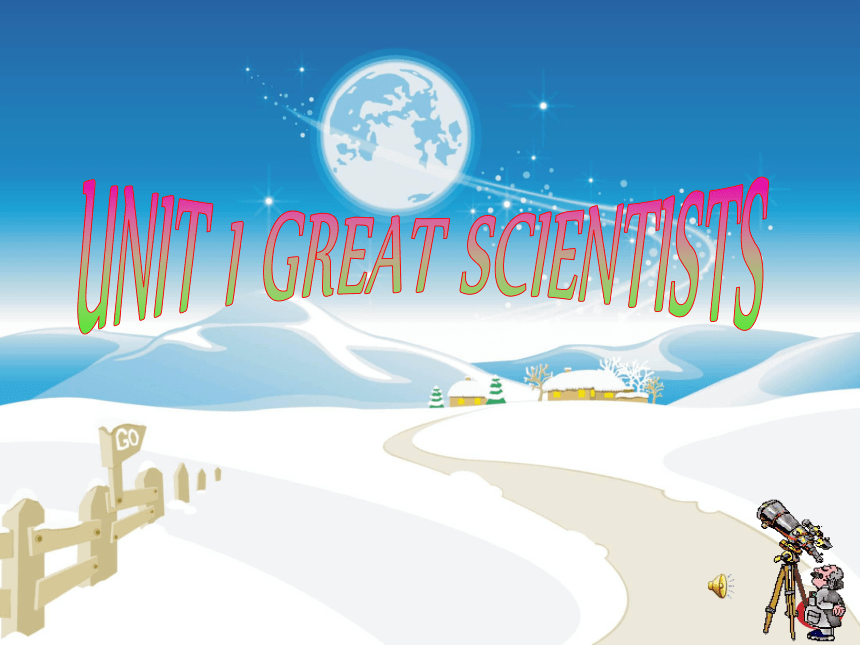
|
|
| 格式 | rar | ||
| 文件大小 | 8.9MB | ||
| 资源类型 | 教案 | ||
| 版本资源 | 人教版(新课程标准) | ||
| 科目 | 英语 | ||
| 更新时间 | 2009-09-03 00:00:00 | ||
图片预览

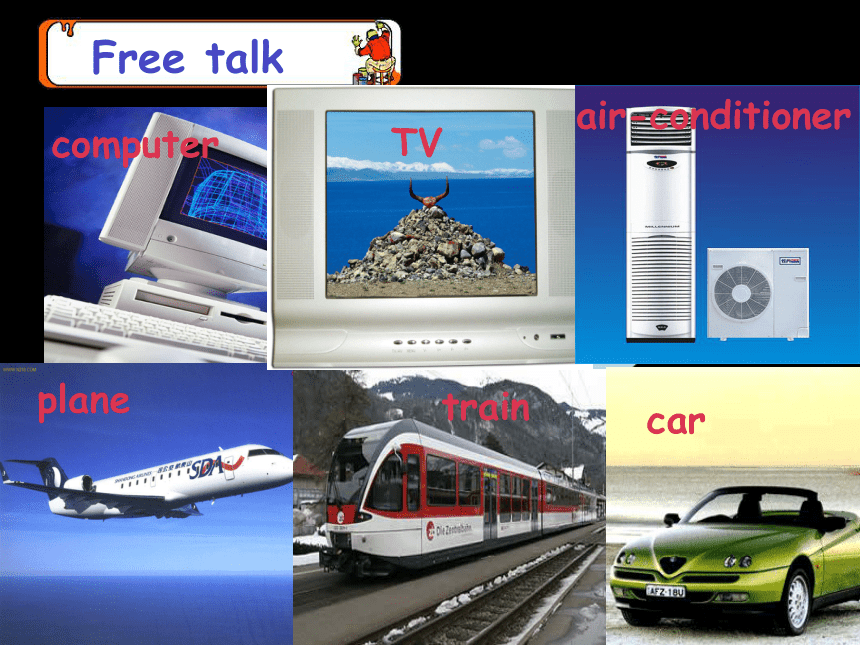
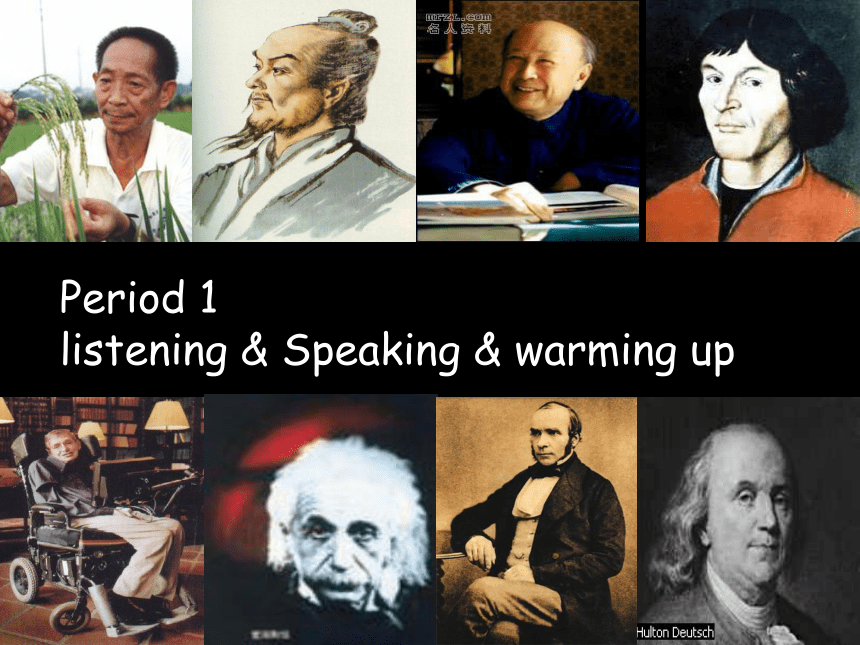
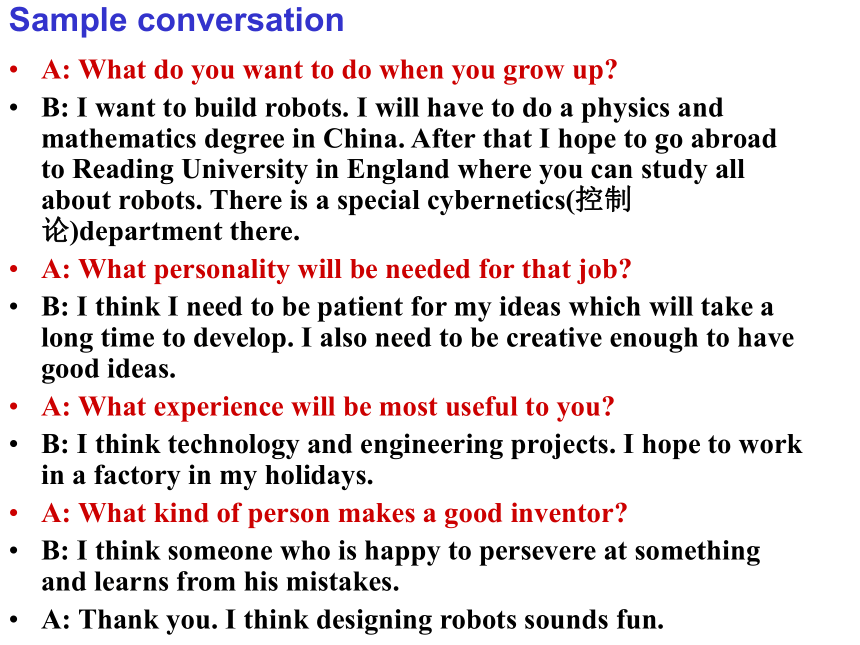
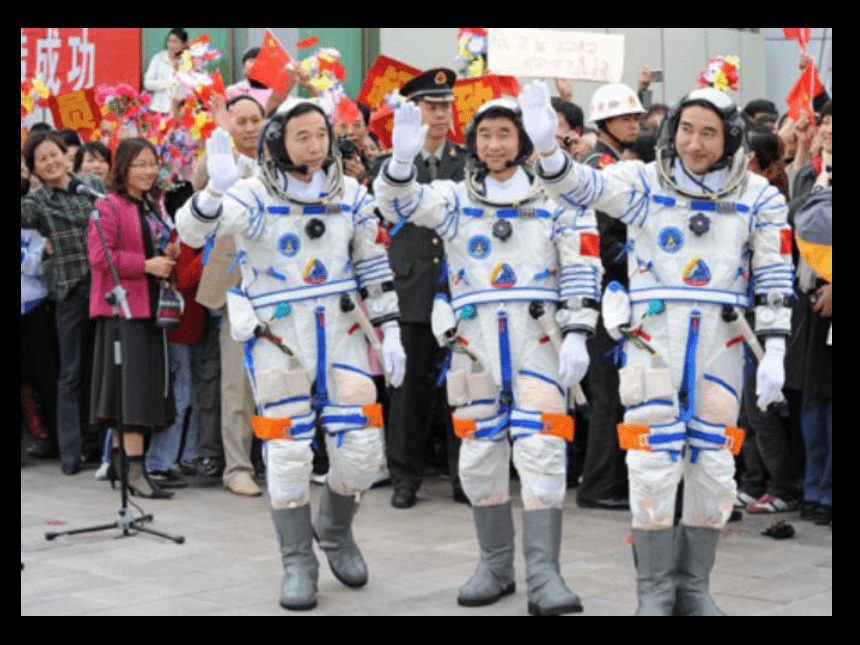
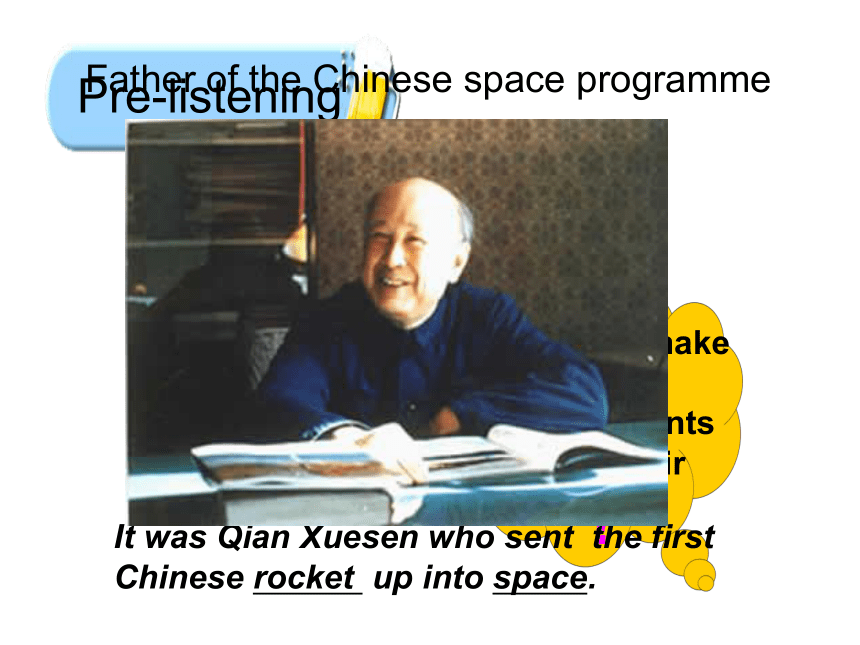
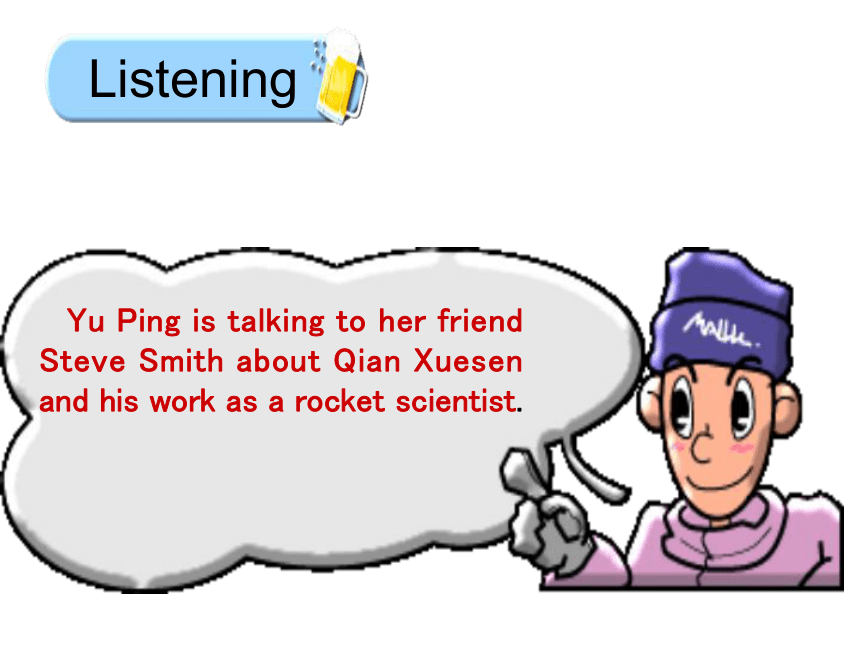
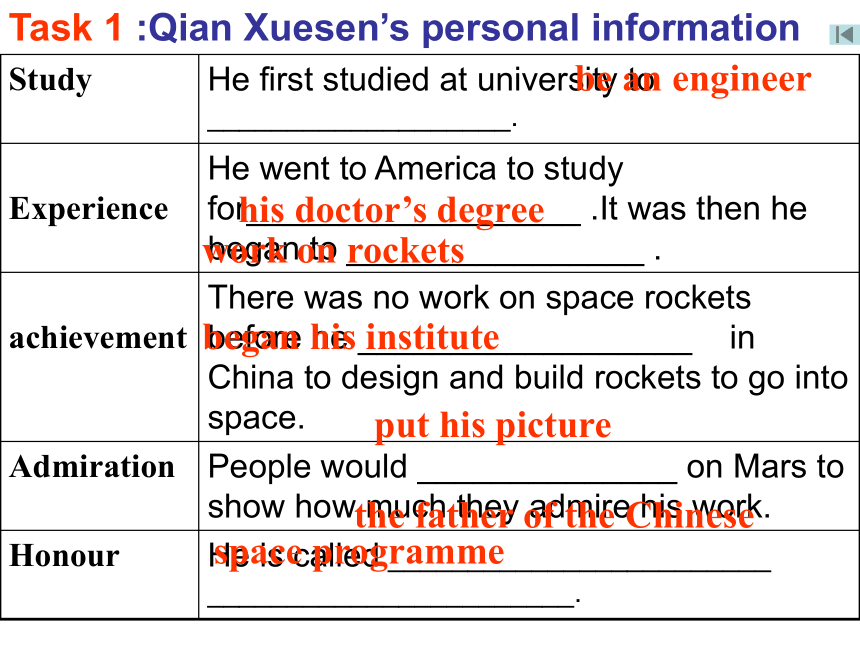
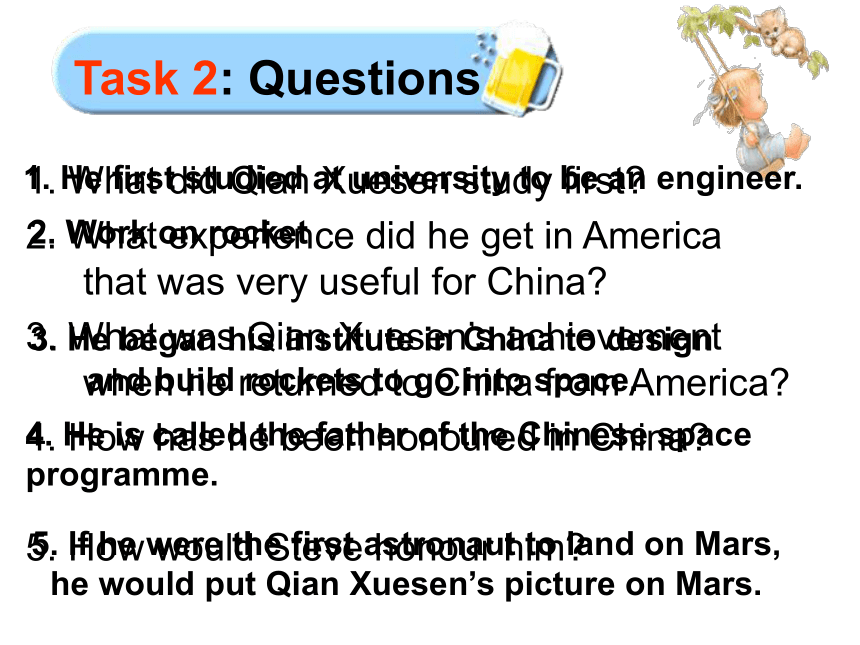
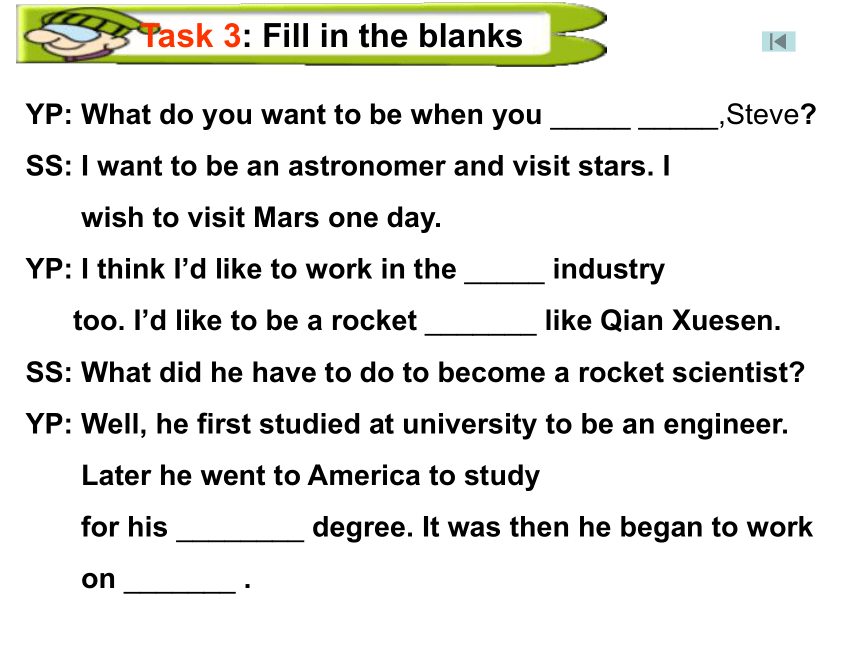
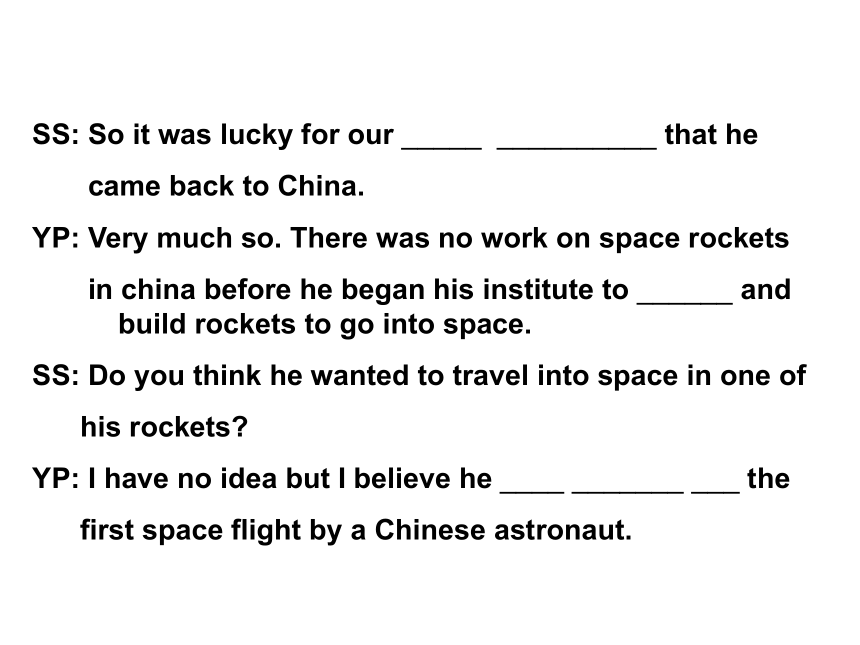
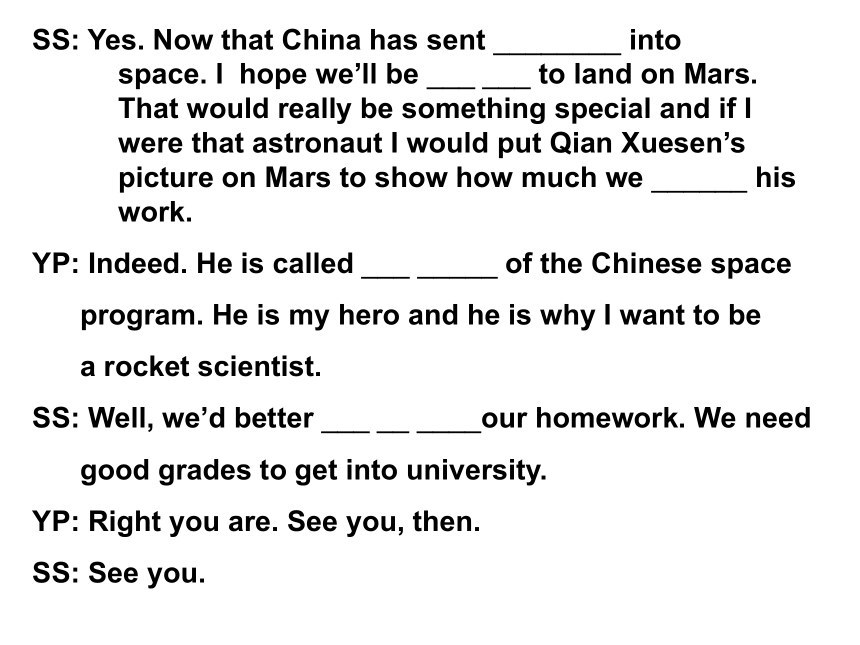
文档简介
课件91张PPT。UNIT 1 GREAT SCIENTISTSFree talkPeriod 1
listening & Speaking & warming up Sample conversationA: What do you want to do when you grow up?
B: I want to build robots. I will have to do a physics and mathematics degree in China. After that I hope to go abroad to Reading University in England where you can study all about robots. There is a special cybernetics(控制论)department there.
A: What personality will be needed for that job?
B: I think I need to be patient for my ideas which will take a long time to develop. I also need to be creative enough to have good ideas.
A: What experience will be most useful to you?
B: I think technology and engineering projects. I hope to work in a factory in my holidays.
A: What kind of person makes a good inventor?
B: I think someone who is happy to persevere at something and learns from his mistakes.
A: Thank you. I think designing robots sounds fun.Pre-listening?
It was Qian Xuesen who sent the first
Chinese rocket up into space.
Father of the Chinese space programmeListening Yu Ping is talking to her friend Steve Smith about Qian Xuesen and his work as a rocket scientist.be an engineerhis doctor’s degreework on rocketsbegan his instituteput his picture the father of the Chinesespace programme1. What did Qian Xuesen study first?
2. What experience did he get in America that was very useful for China?
3. What was Qian Xuesen’s achievement when he returned to China from America?
4. How has he been honoured in China?
5. How would Steve honour him?Task 2: Questions1. He first studied at university to be an engineer. 2. Work on rocket 3. He began his institute in China to design and build rockets to go into space.4. He is called the father of the Chinese space programme.5. If he were the first astronaut to land on Mars, he would put Qian Xuesen’s picture on Mars.
YP: What do you want to be when you _____ _____,Steve?
SS: I want to be an astronomer and visit stars. I
wish to visit Mars one day.
YP: I think I’d like to work in the _____ industry
too. I’d like to be a rocket _______ like Qian Xuesen.
SS: What did he have to do to become a rocket scientist?
YP: Well, he first studied at university to be an engineer.
Later he went to America to study
for his ________ degree. It was then he began to work
on _______ .Task 3: Fill in the blanksSS: So it was lucky for our _____ __________ that he
came back to China.
YP: Very much so. There was no work on space rockets
in china before he began his institute to ______ and build rockets to go into space.
SS: Do you think he wanted to travel into space in one of
his rockets?
YP: I have no idea but I believe he ____ _______ ___ the
first space flight by a Chinese astronaut.SS: Yes. Now that China has sent ________ into space. I hope we’ll be ___ ___ to land on Mars. That would really be something special and if I were that astronaut I would put Qian Xuesen’s picture on Mars to show how much we ______ his work.
YP: Indeed. He is called ___ _____ of the Chinese space
program. He is my hero and he is why I want to be
a rocket scientist.
SS: Well, we’d better ___ __ ____our homework. We need
good grades to get into university.
YP: Right you are. See you, then.
SS: See you. YP: What do you want to be when you _____ _____,Steve?
SS: I want to be an astronomer and visit stars. I
wish to visit Mars one day.
YP: I think I’d like to work in the _____ industry
too. I’d like to be a rocket _______ like Qian Xuesen.
SS: What did he have to do to become a rocket scientist?
YP: Well, he first studied at university to be an engineer.
Later he went to America to study
for his ________ degree. It was then he began to work
on _______ .
grow upspacescientistdoctor’s rocketsAnswers:SS: So it was lucky for our _____ __________ that he
came back to China.
YP: Very much so. There was no work on space rockets
in china before he began his institute to ______ and build rockets to go into space.
SS: Do you think he wanted to travel into space in one of
his rockets?
YP: I have no idea but I believe he ____ _______ ___ the
first space flight by a Chinese astronaut.space programdesignlook forward toSS: Yes. Now that China has sent ________ into space. I hope we’ll be ___ ___ to land on Mars. That would really be something special and if I were that astronaut I would put Qian Xuesen’s picture on Mars to show how much we ______ his work.
YP: Indeed. He is called ___ _____ of the Chinese space
program. He is my hero and he is why I want to be
a rocket scientist.
SS: Well, we’d better ___ __ ____our homework. We need
good grades to get into university.
YP: Right you are. See you, then.
SS: See you. satellitesthe firstadmirethe fatherget on withDo you remember them?I put forward the theory about black holes.I’m the father of super hybrid riceWho is he?He has made a famous kite experiment.He learned a lot from it and invented lightning
rod(避雷针).He is … Benjamin FranklinNever put off until tomorrow what you can do today.今日事,今日毕.Who is he?He is called the greatest scientist in the 20th
century.He is famous for the Theory of Relativity.He is … Albert EinsteinImagination is more important than knowledge"想象力比知识更重要."imaginativeWho is he?He invented electric bulbs.He made more than 1,000 inventions during
his life.He is … Thomas EdisonGenius is one percent inspiration and ninety-nine percent perspiration.天才就是百分之九十九的汗水加上百分之一的灵感.Who is she?She is a woman scientist.She discovered radium(镭)and polonium(钋).
In her life, she won the Nobel Prize twice.She is … Marie CurieNothing in life is to be feared. It is only to be understood.生活中没有什么可怕的东西,只有需要理解的东西.Who is he?He made the first telescope in the world.His observations show that the earth moves
around the sun.He is … Galileo GalileiYou cannot teach a man anything. You can only help him find it within himself.
你不可能把一切都教给一个人, 你只能帮助他从内心去发现(和了解)事物。 do sth. on one’s own initiative自主,主动Do you know any other famous scientists? What
are they famous for?Charles DarwinStephen HawkingZhang HengDiscussion:Sir. Issac Newton1.Which scientist discovered that objects in water are lifted up by a force that helps them float?Archimedes
阿基米德
(287-212 BC)
an ancient Greek
mathematician & physicist2.Who wrote a book explaining how animals and plants developed as the environment changed?Charles Darwin (1808-1882) British
author of The Origin of Species 3.Who invented the first steam engine?Thomas Newcomen 纽可门
(1663-1729) British, invented a steam engine. James Watt improved it and turned it into the first modern steam engine used on the railways. Do you know? 发明蒸汽机的并不是瓦特,他是改进纽可门的蒸气机并发明出双动作,使世界进入“蒸气时代”的,使他成为第一次工业革命中的名气最大的发明家。4.Who used peas to show how physical characteristics are passed from parents to their children?Gregor Mendel
孟德尔
(1822-1884) Czech (捷克人)1865年,修士孟德尔在一个会议上报告了他通过长达八年的实验研究和他所统计的多达两万一千多件样本的实验结果,利用豌豆实验发现了植物的遗传规律,但是孟道尔的理论超出了当时人们能够接受的水平。35年后,三国科学家几乎是同时发现了植物遗传的规律。而当他们准备发表论文,去查阅文献时,又不约而同地发现,早在35年前孟德尔就发现这样的规律了。他们三个人在发表论文时,都提到了孟德尔的文章,称自己的工作是证实了孟德尔的定律。这就是生物学史上的有名的“孟德尔定律的再发现”。5.Who discovered radium?Marie Curie (1867-1934) (Polish and French, won two Nobel Prizes)6.Who invented the way of giving electricity to everybody in large cities?Thomas Edison (1847-1931)
an American inventorThe Inventions of Thomas Edison Phonograph (留声机)Light bulb(电灯泡)Motion Pictures(电影)7.Who was the painter that studied dead bodies to improve his painting of people? Mona LisaLeonardo da Vinci
(1452-1519) Italian artist8.Who invented a lamp to keep miners safe underground?Sir Humphry Davy
汉弗来.戴维爵士
(1778-1829)BritishMiniature(小型的) Miner's Safety Lamp 英国化学家、诗人汉弗莱·戴维。1778年出生。他小时聪明、淘气,不喜欢读书,喜欢玩乐。他不到20岁时,父亲去世。为了养家糊口,他到当地一位医生那当学徒,从此接触并喜欢上化学,因为觉得自己知识浅薄,他就自订计划发奋用功,凭着他的天资和勤奋,很快掌握了七种语言和不少科学知识,并最终成为了英国皇家学会的主席。1798年戴维的名声随着他对笑气的发现而传遍了整个英国。他还带病专门研究火焰,发明了矿用安全灯(1816),这种灯一直到今天仍叫戴维灯,曾挽救了成千上万名矿工的生命。9.Who invented the earliest instrument to tell people where earthquakes happened?Zhang Heng
(78-139) Chinese, invented seismograph10.Who put forward a theory about black holes?Stephen Hawking
(1942--) a British astronomerPair workIt’s very pity that these scientists couldn’t
get together to have a talk. Now let’s organize
a party for them. Because of an advanced
machine called Time Machine, all the scientists
from all different times can come to attend
(join in) the party. They may talk about these:
1.I wonder if you’re…
2.I know you because I’ve heard that you…
3.Thank you for knowing so much about me.
4.I’m the one who…
5.I’m really interested in your invention.……
They may ask about these:
1.What’s your nationality? (I’m from…)
2.What are you interested in?
3.What conclusion have you drawn?
4.What are you proud of?
5.What leads to your success? (My cautiousness/ creativeness/ determination…leads to…)……Act out
your dialogue1. Tell your partner about the great scientists
and their achievements.
2. Revise the new words and expressions
learned in this lesson , and preview those
of the reading text.
3. 优质课堂1+1 :完形填空
Homework:patientpersonalitypositivestrictperseverantconfidentpleasantunselfishenergetic co-operativeintelligentbravecreativedeterminedpolitepassionatecarefulhard-working遗传学
电
浮力定理
镭
进化论
画家
蒸汽机
矿工安全灯
黑洞理论
地动仪
阿基米德 Archimedes
达尔文 Charles Darwin
纽可门 Thomas Newcomen
孟德尔 Gregor Mendel
居里夫人 Marie Curie
爱迪生 Thomas Edison
达芬奇 Leonardo de Vinci
汉弗来.戴维爵士Sir Humphry Davy
张衡 Zhang Heng
斯蒂芬.霍金 Stephen HawkingWarming Up
Match the names and what they are famous for .What infectious diseases impressed you most in recent years?Kinds of infectious disease:John Snow defeats “King Cholera”Reading
John Snow“King Cholera”What do you think the word “King” in the title is ?
Cholera
Why do we call cholera king?
A deadly/infectious disease
What kind of king it is?
Cruel, terrible…
Put the events in right order.__ John Snow began to test two theories.
__ An outbreak of cholera hit London in 1854.
__ John Snow marked the deaths on a map.
__ He announced that the water carried the disease.
__ John Snow investigated two streets where the outbreak was very severe.
__ King Cholera was defeated.
__ He found that most of the deaths were near a water pump.
__ He had the handle removed from the water pump.21473856Do you know how to prove a new idea in scientific research? Discuss in small groups the stages in examining a new scientific idea. What order would you put them in?Draw a conclusion Think of a method Collect results Make up a question Find a problem Analyse the results Find supporting evidencedraw a conclusionfind a problemmake up a questionthink of a methodcollect resultsanalyse the resultsHow to prove a new idea in scientific research?Find supporting evidence1234567Para.Stages in an
experimentWhat / How?Find a problemMake a questionThink of a
methodCollect resultsAnalyse resultsFind supporting
evidenceDraw a
conclusionWhat causes cholera?Which theory is correct?Collect data on those who fell ill or
died and where they lived.Plot information on a map to find out
where people died or did not die.Find out where they got their water.
Analyse the water to see if it is the
cause of the deaths.Find other evidence to support
the analysis.It was certain that polluted water carried
the disease. The source of all drinking
water should be examined to make sure
It is safe.Paragraph 2What are the two theories? Which one is more reasonable?The first suggested that cholera multiplied in the air without reason.The second suggested that people absorbed this disease into their bodies with their meals. 16372089pump3840BROAD STREETCAMBRIDGE STREET21John Snow's Cholera Map7PubWater companyThe Source of the Polluted WaterUpper reaches of riverLower reachesWater pumpParagraph 6What is the extra evidence?
Two other deaths in another part of London that were linked to the Broad Street outbreak.Paragraph 7What are John Snow’s suggestions?1.The source of all water supplies should be examined.2. The water companies were also instructed not to expose people to polluted water anymore.1. John Snow believed Idea 2 was right. How did he finally prove it?KEY: John Snow finally proved his idea because he found an outbreak that was clearly related to cholera, collected information and was able to tie cases outside the area to the polluted water.Read the passage again and answer these questions.2. Do you think John Snow would have solved this problem without the map? Give a reason.KEY: No. The map helped John Snow organize his ideas. He was able to identify those households that had many deaths and check their water-drinking habits. He identified those houses that had no deaths and surveyed their drinking habits. The evidence clearly pointed to the polluted water being the cause.3. Cholera was a 19th century disease. What disease do you think is similar to cholera today?How to write a summary? Before writing you should review the most important points of the text.
It should be brief .
It should be written as much as possible in your own words.
It contains only the main ideas or the topic the author talks about but not include much explanation or examples.
How to write a
summaryKey wordsKey sentencesOwn wordsChange the voiceSentence structureThe summary of the passage John Snow wanted to find the cause of cholera. He believed that people became ill after eating infected food. He used the next outbreak of cholera to test his idea. He studied a small area of houses which got their water from the same pump. Many people in the area died. John Snow showed that this was because the water in the pump was infected. He showed that cholera could be defeated if people drank clear water.
Fill in the blanks:
John Snow was so e ______ that he a________
Queen Victoria . He wanted to find the c______ of cholera in order to d______ it. He was determined to face the c__________ so that people e_______ to it would not fall v________ to/of the d_________ disease. In 1854 when a cholera b______ out, he began to gather information. He m______ on a map where all the dead people had lived and he found that many people who had drunk the dirty water from the p______ died. So he decided that the polluted water carried the virus. He told people to remove the h________. He suggested that the s_____ of all water supply be e__________ and the water companies were i__________ not to e________ people to polluted water any more. Finally, “King Cholera” was defeated.
xpertttendedauseefeathallengexposedictimeadlyrokearkedumpandleourcexaminednstructedxposeattend v.
1)to be present at; go to (meeting, conference, lecture…) 出席,参加:Language points for reading Iattend school
attend a lecture
attend church
attend a wedding ceremony 上学
听讲座
去教堂
出席婚礼What do you know about Dr. John Snow’s being well-known in London?
John Snow was a famous doctor in London---so expert, indeed that he attended Queen Victoria as her personal physician.
(2)to look after, care for, serve 照看,照料.
attend (on/upon) sb.医生照看病人.The doctor attended the patients.稍后我们将关注那个问题。We’ll attend to the problem later.(3) attend to sth. 处理,专心于某事n. attendance 出席人数;照看,照顾
There was a large attendance at the concert.
There is a doctor in attendance.But he became inspired when he thought about helping ordinary people exposed to cholera.exposed to cholera 在句子中是过去分词用作后置定语,表示被动.意为 “患霍乱的”.如:鲁迅写的书是很受欢迎的.
The book written by LuXun is very popular. 昨天我们看见的那个人是史密斯先生.The man seen by us yesterday is Professor Smith.2. From what disease did Londoners suffer in his age?They exposed themselves to cholera.).expose v.
to make visible 暴露(某物,某人)
expose sb./ sth. to….
不要把你的皮肤暴露于强烈的阳光下。
Don’t expose your skin to the strong sunlight.
be exposed to 使暴露在….
The scandal was exposed to public finally.
(2) to reveal the guilty of揭露;揭发
expose sb./sth.
他向警方揭发了那个阴谋。
He exposed the plot to the police.
I threatened to expose him ( to the police).
adj. exposed暴露的,暴露于风雨中的
n. exposure 暴露,显露
开放思维: expose sth to the light of day
把某事暴露于光天化日之下
expose a fraud
揭穿骗局3.So many thousands of terrified people died every time there was an outbreak.every time 在这里是连词,引导时间状语从句,意为“每次,每当”e.g. Every time I meet him, I always think of the things that happened between us.每次见到他,我就想起发生在我们之间的事情。every/ each/ any/ next/ the first/ the last time
the moment/ the second/ the minute/ the instant
immediately, directly, instantly 等与 every time一样,都可以用作连词引导时间状语从句,意为 “一…..就”。如:
那个年轻人对那个可爱的姑娘一见钟情。
The young man fell in love with the lovely girl the first time he saw her.
我一见到他就把这封信给他。
I will give the letter to him immediately I see him.
be in control of
be in the control of = under the control of
lose control (of sth.) = be out of control (of sth.)
政府努力控制物价。
The government tries its best to control prices.
司机失去了控制车撞到了树上。
The driver lost control of his car and it knocked into a tree.
Mr. Brown is ____________ the money.
The money is ___________________ Mr. Brown.in control ofin/under the control of4. When did Dr. Snow think the disease would be controlled?He knew he would never be controlled until its cause was found.absorb sth. (into) 吸收
全神贯注于……
absorb oneself in sth.
= be absorbed in sth.
海绵吸水
A sponge absorbs water.
这个小姑娘正在全神贯注地阅读一篇故事。
The little girl was absorbed in reading a tale.6. What was the second theory explaining how the disease killed people?People absorbed this disease into their bodies with their meals.他发现在两条街道上霍乱流行的特别厉害,在十天之内就死去了五百多人。
7.In two particular streets, the cholera outbreak was so severe that more than 500 people died in 10 days.severe v. (1)unsparing or harsh, as in treatment of others; strict 严厉的;苛刻的;严格的. 如:
The severe trainer has gone abroad. You can breathe freely again.
(2)causing sharp discomfort or distress; extremely violent or intense; very serious. 剧痛的,剧烈的,严重的,难熬的 如:
a severe attack of toothache.要求苛严的教官已经出国.你可以完全放心。 牙痛的剧烈发作。8. What did Dr. Snow think was responsible for the disease?
It seemed the water was to blame.
They blamed the secretary for the delay of the plan.
The driver was not to blame for the traffic accident.
He is ready to take the blame for what had happened.
blame 责备,归咎
v. blame sb. for sth./doing sth.
因为某事责备某人
blame sth. on sb.
把某事归咎于某人身上
be to blame (for …)
该受责备,应负责
这场事故该由哪个司机负责?
Which driver was to blame for the accident?
n. accept/ take/ bear the blame for…
承担……的责任
lay/ put the blame on…
把……归咎于9.Next,John Snow looked into the source of the water for these two streets.
其次,约翰.斯诺调查了这两条街的水源。look into 看…...里面;to investigate 调查;了解。 如:
我们将一起调查这个问题。
We’ll look into this matter together.
开放思维:
look on 观看,面向,旁观,看待
look out 面朝,留神,照料
look over 从上面看,察看,检查
look around 环顾,观光,察看
look through 看穿,审核,浏览,温习
look up and down 仔细打量,到处寻找
look after 寻求,照顾,关心In addition, he found two other deaths in another parts of London that were linked to the Broad Street outbreak.
除此之外,他发现在伦敦的另一个地方有两个死亡的病例与宽街爆发的霍乱有关联。in addition adv. 另外 如:
In addition, the course also produces practical experience.
此外这门功课还提供了实践的基础。10.What else did Dr. Snow find in another part of London that were linked to the Broad Street outbreak? There will be five of us for dinner, besides John.The restaurant is open every day except Monday.The meal was excellent except for the first course.In addition to French, he has studied Japanese.=Besides / Apart from French, he has studied Japanese.Apart from his school work, he takes interests in anything.Apart from the injuries to his face and hands, he broke both legs.=He takes interests in anything except his school work.=Besides the injuries to his face and hands, he broke both legs.Apart from his nose, he’s quite good-looking.=Except for his nose, he’s quite good-looking.She sings very well, in addition, she dances gracefully.=She sings very well, besides, she dances gracefully.=She sings very well, and she dances gracefully as well.=She sings as well as dances.link…to... 把…与…连接;联系 如:
指纹证实了嫌疑犯的犯罪事实。
Fingerprints linked the suspect to the crime.
be linked to 连接 如:
The two towns are linked by a railway.John Snow was a famous doctor in London-so expert, indeed, that he attended Queen Victoria as her personal physician.
But he became inspired when he thought about helping ordinary people exposed to cholera.
Neither its cause, nor its cure was understood.
So many thousands of terrified people died every time there was an outbreak.
Key SentencesHe knew that cholera would never be controlled until its cause was found.
First he marked on a map the extra places where all the dead people had lived.
It seemed that the water was to blame.
He immediately told the astonished people in Broad Street to remove the handle from the pump so that it could not be used.
To prevent this from happening again, John Snow suggested that the source of all the water supplies be examined .Useful phraseslift up
steam engine
physical characteristics
put forward a theory
in scientific research
set out a new scientific idea
draw a conclusion
analyse the results举起,抬起,提升
蒸汽机
人体的特征
提出一个理论
在科学研究上
验证一个新的科学思想
得出结论
分析结果infectious disease
attend sb.
personal physician
ordinary people
be exposed to
the deadly disease
terrified people
face the challenge
become interested in
absorb into
the affected person 传染性的疾病
照顾某人
私人医生
普通百姓
被暴露在…
致命的疾病
惊恐的老百姓
面对挑战
对…感兴趣
吸收,引进
患者,受感染的人spread through poor neighborhoods
gather information
be determined to
a valuable clue
the water pump
make further investigation
be to blame
remove the handle
slow down
在贫民区蔓延
收集信息
决心
一条有价值的线索
水泵
深入调查
该受责备
拆掉把手
缓解supporting evidence
be linked to
have sth. delivered
die of
announce with certainty
instruct sb. to do sth.
the polluted water有力的证据
与…有关联
派人运送…
死于
肯定地宣布
指令…做…
被污染的水Homework1. Read this text again and try to find out some important or difficult words and expressions.
2. Preview “Learning about language—Discovering useful words and expressions”.Scientific Report by John SnowThe problemThe causeThe methodThe resultsIdea 1or2,whyThe conclusionNobody knew the cause of the serious disease of choleraStrange cloud in the air that attacked victimsPeople absorbed the disease with their mealsCollect information from the next cholera attack to test theories.Try to prove which method was correctHe found the cause of cholera was the polluted waterIdea2.Because the information showed a connection with the waterJohn snow was able to defeat cholera once its cause was knownJohn Snow经过流行病学调查
推论: “霍乱患者的粪便含有能繁殖的‘病毒’,霍乱在人群中的传播途径主要是被患者粪便污染的水源”
1883年,Robert Koch 最终发现了霍乱弧菌(Vibrio cholera )
listening & Speaking & warming up Sample conversationA: What do you want to do when you grow up?
B: I want to build robots. I will have to do a physics and mathematics degree in China. After that I hope to go abroad to Reading University in England where you can study all about robots. There is a special cybernetics(控制论)department there.
A: What personality will be needed for that job?
B: I think I need to be patient for my ideas which will take a long time to develop. I also need to be creative enough to have good ideas.
A: What experience will be most useful to you?
B: I think technology and engineering projects. I hope to work in a factory in my holidays.
A: What kind of person makes a good inventor?
B: I think someone who is happy to persevere at something and learns from his mistakes.
A: Thank you. I think designing robots sounds fun.Pre-listening?
It was Qian Xuesen who sent the first
Chinese rocket up into space.
Father of the Chinese space programmeListening Yu Ping is talking to her friend Steve Smith about Qian Xuesen and his work as a rocket scientist.be an engineerhis doctor’s degreework on rocketsbegan his instituteput his picture the father of the Chinesespace programme1. What did Qian Xuesen study first?
2. What experience did he get in America that was very useful for China?
3. What was Qian Xuesen’s achievement when he returned to China from America?
4. How has he been honoured in China?
5. How would Steve honour him?Task 2: Questions1. He first studied at university to be an engineer. 2. Work on rocket 3. He began his institute in China to design and build rockets to go into space.4. He is called the father of the Chinese space programme.5. If he were the first astronaut to land on Mars, he would put Qian Xuesen’s picture on Mars.
YP: What do you want to be when you _____ _____,Steve?
SS: I want to be an astronomer and visit stars. I
wish to visit Mars one day.
YP: I think I’d like to work in the _____ industry
too. I’d like to be a rocket _______ like Qian Xuesen.
SS: What did he have to do to become a rocket scientist?
YP: Well, he first studied at university to be an engineer.
Later he went to America to study
for his ________ degree. It was then he began to work
on _______ .Task 3: Fill in the blanksSS: So it was lucky for our _____ __________ that he
came back to China.
YP: Very much so. There was no work on space rockets
in china before he began his institute to ______ and build rockets to go into space.
SS: Do you think he wanted to travel into space in one of
his rockets?
YP: I have no idea but I believe he ____ _______ ___ the
first space flight by a Chinese astronaut.SS: Yes. Now that China has sent ________ into space. I hope we’ll be ___ ___ to land on Mars. That would really be something special and if I were that astronaut I would put Qian Xuesen’s picture on Mars to show how much we ______ his work.
YP: Indeed. He is called ___ _____ of the Chinese space
program. He is my hero and he is why I want to be
a rocket scientist.
SS: Well, we’d better ___ __ ____our homework. We need
good grades to get into university.
YP: Right you are. See you, then.
SS: See you. YP: What do you want to be when you _____ _____,Steve?
SS: I want to be an astronomer and visit stars. I
wish to visit Mars one day.
YP: I think I’d like to work in the _____ industry
too. I’d like to be a rocket _______ like Qian Xuesen.
SS: What did he have to do to become a rocket scientist?
YP: Well, he first studied at university to be an engineer.
Later he went to America to study
for his ________ degree. It was then he began to work
on _______ .
grow upspacescientistdoctor’s rocketsAnswers:SS: So it was lucky for our _____ __________ that he
came back to China.
YP: Very much so. There was no work on space rockets
in china before he began his institute to ______ and build rockets to go into space.
SS: Do you think he wanted to travel into space in one of
his rockets?
YP: I have no idea but I believe he ____ _______ ___ the
first space flight by a Chinese astronaut.space programdesignlook forward toSS: Yes. Now that China has sent ________ into space. I hope we’ll be ___ ___ to land on Mars. That would really be something special and if I were that astronaut I would put Qian Xuesen’s picture on Mars to show how much we ______ his work.
YP: Indeed. He is called ___ _____ of the Chinese space
program. He is my hero and he is why I want to be
a rocket scientist.
SS: Well, we’d better ___ __ ____our homework. We need
good grades to get into university.
YP: Right you are. See you, then.
SS: See you. satellitesthe firstadmirethe fatherget on withDo you remember them?I put forward the theory about black holes.I’m the father of super hybrid riceWho is he?He has made a famous kite experiment.He learned a lot from it and invented lightning
rod(避雷针).He is … Benjamin FranklinNever put off until tomorrow what you can do today.今日事,今日毕.Who is he?He is called the greatest scientist in the 20th
century.He is famous for the Theory of Relativity.He is … Albert EinsteinImagination is more important than knowledge"想象力比知识更重要."imaginativeWho is he?He invented electric bulbs.He made more than 1,000 inventions during
his life.He is … Thomas EdisonGenius is one percent inspiration and ninety-nine percent perspiration.天才就是百分之九十九的汗水加上百分之一的灵感.Who is she?She is a woman scientist.She discovered radium(镭)and polonium(钋).
In her life, she won the Nobel Prize twice.She is … Marie CurieNothing in life is to be feared. It is only to be understood.生活中没有什么可怕的东西,只有需要理解的东西.Who is he?He made the first telescope in the world.His observations show that the earth moves
around the sun.He is … Galileo GalileiYou cannot teach a man anything. You can only help him find it within himself.
你不可能把一切都教给一个人, 你只能帮助他从内心去发现(和了解)事物。 do sth. on one’s own initiative自主,主动Do you know any other famous scientists? What
are they famous for?Charles DarwinStephen HawkingZhang HengDiscussion:Sir. Issac Newton1.Which scientist discovered that objects in water are lifted up by a force that helps them float?Archimedes
阿基米德
(287-212 BC)
an ancient Greek
mathematician & physicist2.Who wrote a book explaining how animals and plants developed as the environment changed?Charles Darwin (1808-1882) British
author of The Origin of Species 3.Who invented the first steam engine?Thomas Newcomen 纽可门
(1663-1729) British, invented a steam engine. James Watt improved it and turned it into the first modern steam engine used on the railways. Do you know? 发明蒸汽机的并不是瓦特,他是改进纽可门的蒸气机并发明出双动作,使世界进入“蒸气时代”的,使他成为第一次工业革命中的名气最大的发明家。4.Who used peas to show how physical characteristics are passed from parents to their children?Gregor Mendel
孟德尔
(1822-1884) Czech (捷克人)1865年,修士孟德尔在一个会议上报告了他通过长达八年的实验研究和他所统计的多达两万一千多件样本的实验结果,利用豌豆实验发现了植物的遗传规律,但是孟道尔的理论超出了当时人们能够接受的水平。35年后,三国科学家几乎是同时发现了植物遗传的规律。而当他们准备发表论文,去查阅文献时,又不约而同地发现,早在35年前孟德尔就发现这样的规律了。他们三个人在发表论文时,都提到了孟德尔的文章,称自己的工作是证实了孟德尔的定律。这就是生物学史上的有名的“孟德尔定律的再发现”。5.Who discovered radium?Marie Curie (1867-1934) (Polish and French, won two Nobel Prizes)6.Who invented the way of giving electricity to everybody in large cities?Thomas Edison (1847-1931)
an American inventorThe Inventions of Thomas Edison Phonograph (留声机)Light bulb(电灯泡)Motion Pictures(电影)7.Who was the painter that studied dead bodies to improve his painting of people? Mona LisaLeonardo da Vinci
(1452-1519) Italian artist8.Who invented a lamp to keep miners safe underground?Sir Humphry Davy
汉弗来.戴维爵士
(1778-1829)BritishMiniature(小型的) Miner's Safety Lamp 英国化学家、诗人汉弗莱·戴维。1778年出生。他小时聪明、淘气,不喜欢读书,喜欢玩乐。他不到20岁时,父亲去世。为了养家糊口,他到当地一位医生那当学徒,从此接触并喜欢上化学,因为觉得自己知识浅薄,他就自订计划发奋用功,凭着他的天资和勤奋,很快掌握了七种语言和不少科学知识,并最终成为了英国皇家学会的主席。1798年戴维的名声随着他对笑气的发现而传遍了整个英国。他还带病专门研究火焰,发明了矿用安全灯(1816),这种灯一直到今天仍叫戴维灯,曾挽救了成千上万名矿工的生命。9.Who invented the earliest instrument to tell people where earthquakes happened?Zhang Heng
(78-139) Chinese, invented seismograph10.Who put forward a theory about black holes?Stephen Hawking
(1942--) a British astronomerPair workIt’s very pity that these scientists couldn’t
get together to have a talk. Now let’s organize
a party for them. Because of an advanced
machine called Time Machine, all the scientists
from all different times can come to attend
(join in) the party. They may talk about these:
1.I wonder if you’re…
2.I know you because I’ve heard that you…
3.Thank you for knowing so much about me.
4.I’m the one who…
5.I’m really interested in your invention.……
They may ask about these:
1.What’s your nationality? (I’m from…)
2.What are you interested in?
3.What conclusion have you drawn?
4.What are you proud of?
5.What leads to your success? (My cautiousness/ creativeness/ determination…leads to…)……Act out
your dialogue1. Tell your partner about the great scientists
and their achievements.
2. Revise the new words and expressions
learned in this lesson , and preview those
of the reading text.
3. 优质课堂1+1 :完形填空
Homework:patientpersonalitypositivestrictperseverantconfidentpleasantunselfishenergetic co-operativeintelligentbravecreativedeterminedpolitepassionatecarefulhard-working遗传学
电
浮力定理
镭
进化论
画家
蒸汽机
矿工安全灯
黑洞理论
地动仪
阿基米德 Archimedes
达尔文 Charles Darwin
纽可门 Thomas Newcomen
孟德尔 Gregor Mendel
居里夫人 Marie Curie
爱迪生 Thomas Edison
达芬奇 Leonardo de Vinci
汉弗来.戴维爵士Sir Humphry Davy
张衡 Zhang Heng
斯蒂芬.霍金 Stephen HawkingWarming Up
Match the names and what they are famous for .What infectious diseases impressed you most in recent years?Kinds of infectious disease:John Snow defeats “King Cholera”Reading
John Snow“King Cholera”What do you think the word “King” in the title is ?
Cholera
Why do we call cholera king?
A deadly/infectious disease
What kind of king it is?
Cruel, terrible…
Put the events in right order.__ John Snow began to test two theories.
__ An outbreak of cholera hit London in 1854.
__ John Snow marked the deaths on a map.
__ He announced that the water carried the disease.
__ John Snow investigated two streets where the outbreak was very severe.
__ King Cholera was defeated.
__ He found that most of the deaths were near a water pump.
__ He had the handle removed from the water pump.21473856Do you know how to prove a new idea in scientific research? Discuss in small groups the stages in examining a new scientific idea. What order would you put them in?Draw a conclusion Think of a method Collect results Make up a question Find a problem Analyse the results Find supporting evidencedraw a conclusionfind a problemmake up a questionthink of a methodcollect resultsanalyse the resultsHow to prove a new idea in scientific research?Find supporting evidence1234567Para.Stages in an
experimentWhat / How?Find a problemMake a questionThink of a
methodCollect resultsAnalyse resultsFind supporting
evidenceDraw a
conclusionWhat causes cholera?Which theory is correct?Collect data on those who fell ill or
died and where they lived.Plot information on a map to find out
where people died or did not die.Find out where they got their water.
Analyse the water to see if it is the
cause of the deaths.Find other evidence to support
the analysis.It was certain that polluted water carried
the disease. The source of all drinking
water should be examined to make sure
It is safe.Paragraph 2What are the two theories? Which one is more reasonable?The first suggested that cholera multiplied in the air without reason.The second suggested that people absorbed this disease into their bodies with their meals. 16372089pump3840BROAD STREETCAMBRIDGE STREET21John Snow's Cholera Map7PubWater companyThe Source of the Polluted WaterUpper reaches of riverLower reachesWater pumpParagraph 6What is the extra evidence?
Two other deaths in another part of London that were linked to the Broad Street outbreak.Paragraph 7What are John Snow’s suggestions?1.The source of all water supplies should be examined.2. The water companies were also instructed not to expose people to polluted water anymore.1. John Snow believed Idea 2 was right. How did he finally prove it?KEY: John Snow finally proved his idea because he found an outbreak that was clearly related to cholera, collected information and was able to tie cases outside the area to the polluted water.Read the passage again and answer these questions.2. Do you think John Snow would have solved this problem without the map? Give a reason.KEY: No. The map helped John Snow organize his ideas. He was able to identify those households that had many deaths and check their water-drinking habits. He identified those houses that had no deaths and surveyed their drinking habits. The evidence clearly pointed to the polluted water being the cause.3. Cholera was a 19th century disease. What disease do you think is similar to cholera today?How to write a summary? Before writing you should review the most important points of the text.
It should be brief .
It should be written as much as possible in your own words.
It contains only the main ideas or the topic the author talks about but not include much explanation or examples.
How to write a
summaryKey wordsKey sentencesOwn wordsChange the voiceSentence structureThe summary of the passage John Snow wanted to find the cause of cholera. He believed that people became ill after eating infected food. He used the next outbreak of cholera to test his idea. He studied a small area of houses which got their water from the same pump. Many people in the area died. John Snow showed that this was because the water in the pump was infected. He showed that cholera could be defeated if people drank clear water.
Fill in the blanks:
John Snow was so e ______ that he a________
Queen Victoria . He wanted to find the c______ of cholera in order to d______ it. He was determined to face the c__________ so that people e_______ to it would not fall v________ to/of the d_________ disease. In 1854 when a cholera b______ out, he began to gather information. He m______ on a map where all the dead people had lived and he found that many people who had drunk the dirty water from the p______ died. So he decided that the polluted water carried the virus. He told people to remove the h________. He suggested that the s_____ of all water supply be e__________ and the water companies were i__________ not to e________ people to polluted water any more. Finally, “King Cholera” was defeated.
xpertttendedauseefeathallengexposedictimeadlyrokearkedumpandleourcexaminednstructedxposeattend v.
1)to be present at; go to (meeting, conference, lecture…) 出席,参加:Language points for reading Iattend school
attend a lecture
attend church
attend a wedding ceremony 上学
听讲座
去教堂
出席婚礼What do you know about Dr. John Snow’s being well-known in London?
John Snow was a famous doctor in London---so expert, indeed that he attended Queen Victoria as her personal physician.
(2)to look after, care for, serve 照看,照料.
attend (on/upon) sb.医生照看病人.The doctor attended the patients.稍后我们将关注那个问题。We’ll attend to the problem later.(3) attend to sth. 处理,专心于某事n. attendance 出席人数;照看,照顾
There was a large attendance at the concert.
There is a doctor in attendance.But he became inspired when he thought about helping ordinary people exposed to cholera.exposed to cholera 在句子中是过去分词用作后置定语,表示被动.意为 “患霍乱的”.如:鲁迅写的书是很受欢迎的.
The book written by LuXun is very popular. 昨天我们看见的那个人是史密斯先生.The man seen by us yesterday is Professor Smith.2. From what disease did Londoners suffer in his age?They exposed themselves to cholera.).expose v.
to make visible 暴露(某物,某人)
expose sb./ sth. to….
不要把你的皮肤暴露于强烈的阳光下。
Don’t expose your skin to the strong sunlight.
be exposed to 使暴露在….
The scandal was exposed to public finally.
(2) to reveal the guilty of揭露;揭发
expose sb./sth.
他向警方揭发了那个阴谋。
He exposed the plot to the police.
I threatened to expose him ( to the police).
adj. exposed暴露的,暴露于风雨中的
n. exposure 暴露,显露
开放思维: expose sth to the light of day
把某事暴露于光天化日之下
expose a fraud
揭穿骗局3.So many thousands of terrified people died every time there was an outbreak.every time 在这里是连词,引导时间状语从句,意为“每次,每当”e.g. Every time I meet him, I always think of the things that happened between us.每次见到他,我就想起发生在我们之间的事情。every/ each/ any/ next/ the first/ the last time
the moment/ the second/ the minute/ the instant
immediately, directly, instantly 等与 every time一样,都可以用作连词引导时间状语从句,意为 “一…..就”。如:
那个年轻人对那个可爱的姑娘一见钟情。
The young man fell in love with the lovely girl the first time he saw her.
我一见到他就把这封信给他。
I will give the letter to him immediately I see him.
be in control of
be in the control of = under the control of
lose control (of sth.) = be out of control (of sth.)
政府努力控制物价。
The government tries its best to control prices.
司机失去了控制车撞到了树上。
The driver lost control of his car and it knocked into a tree.
Mr. Brown is ____________ the money.
The money is ___________________ Mr. Brown.in control ofin/under the control of4. When did Dr. Snow think the disease would be controlled?He knew he would never be controlled until its cause was found.absorb sth. (into) 吸收
全神贯注于……
absorb oneself in sth.
= be absorbed in sth.
海绵吸水
A sponge absorbs water.
这个小姑娘正在全神贯注地阅读一篇故事。
The little girl was absorbed in reading a tale.6. What was the second theory explaining how the disease killed people?People absorbed this disease into their bodies with their meals.他发现在两条街道上霍乱流行的特别厉害,在十天之内就死去了五百多人。
7.In two particular streets, the cholera outbreak was so severe that more than 500 people died in 10 days.severe v. (1)unsparing or harsh, as in treatment of others; strict 严厉的;苛刻的;严格的. 如:
The severe trainer has gone abroad. You can breathe freely again.
(2)causing sharp discomfort or distress; extremely violent or intense; very serious. 剧痛的,剧烈的,严重的,难熬的 如:
a severe attack of toothache.要求苛严的教官已经出国.你可以完全放心。 牙痛的剧烈发作。8. What did Dr. Snow think was responsible for the disease?
It seemed the water was to blame.
They blamed the secretary for the delay of the plan.
The driver was not to blame for the traffic accident.
He is ready to take the blame for what had happened.
blame 责备,归咎
v. blame sb. for sth./doing sth.
因为某事责备某人
blame sth. on sb.
把某事归咎于某人身上
be to blame (for …)
该受责备,应负责
这场事故该由哪个司机负责?
Which driver was to blame for the accident?
n. accept/ take/ bear the blame for…
承担……的责任
lay/ put the blame on…
把……归咎于9.Next,John Snow looked into the source of the water for these two streets.
其次,约翰.斯诺调查了这两条街的水源。look into 看…...里面;to investigate 调查;了解。 如:
我们将一起调查这个问题。
We’ll look into this matter together.
开放思维:
look on 观看,面向,旁观,看待
look out 面朝,留神,照料
look over 从上面看,察看,检查
look around 环顾,观光,察看
look through 看穿,审核,浏览,温习
look up and down 仔细打量,到处寻找
look after 寻求,照顾,关心In addition, he found two other deaths in another parts of London that were linked to the Broad Street outbreak.
除此之外,他发现在伦敦的另一个地方有两个死亡的病例与宽街爆发的霍乱有关联。in addition adv. 另外 如:
In addition, the course also produces practical experience.
此外这门功课还提供了实践的基础。10.What else did Dr. Snow find in another part of London that were linked to the Broad Street outbreak? There will be five of us for dinner, besides John.The restaurant is open every day except Monday.The meal was excellent except for the first course.In addition to French, he has studied Japanese.=Besides / Apart from French, he has studied Japanese.Apart from his school work, he takes interests in anything.Apart from the injuries to his face and hands, he broke both legs.=He takes interests in anything except his school work.=Besides the injuries to his face and hands, he broke both legs.Apart from his nose, he’s quite good-looking.=Except for his nose, he’s quite good-looking.She sings very well, in addition, she dances gracefully.=She sings very well, besides, she dances gracefully.=She sings very well, and she dances gracefully as well.=She sings as well as dances.link…to... 把…与…连接;联系 如:
指纹证实了嫌疑犯的犯罪事实。
Fingerprints linked the suspect to the crime.
be linked to 连接 如:
The two towns are linked by a railway.John Snow was a famous doctor in London-so expert, indeed, that he attended Queen Victoria as her personal physician.
But he became inspired when he thought about helping ordinary people exposed to cholera.
Neither its cause, nor its cure was understood.
So many thousands of terrified people died every time there was an outbreak.
Key SentencesHe knew that cholera would never be controlled until its cause was found.
First he marked on a map the extra places where all the dead people had lived.
It seemed that the water was to blame.
He immediately told the astonished people in Broad Street to remove the handle from the pump so that it could not be used.
To prevent this from happening again, John Snow suggested that the source of all the water supplies be examined .Useful phraseslift up
steam engine
physical characteristics
put forward a theory
in scientific research
set out a new scientific idea
draw a conclusion
analyse the results举起,抬起,提升
蒸汽机
人体的特征
提出一个理论
在科学研究上
验证一个新的科学思想
得出结论
分析结果infectious disease
attend sb.
personal physician
ordinary people
be exposed to
the deadly disease
terrified people
face the challenge
become interested in
absorb into
the affected person 传染性的疾病
照顾某人
私人医生
普通百姓
被暴露在…
致命的疾病
惊恐的老百姓
面对挑战
对…感兴趣
吸收,引进
患者,受感染的人spread through poor neighborhoods
gather information
be determined to
a valuable clue
the water pump
make further investigation
be to blame
remove the handle
slow down
在贫民区蔓延
收集信息
决心
一条有价值的线索
水泵
深入调查
该受责备
拆掉把手
缓解supporting evidence
be linked to
have sth. delivered
die of
announce with certainty
instruct sb. to do sth.
the polluted water有力的证据
与…有关联
派人运送…
死于
肯定地宣布
指令…做…
被污染的水Homework1. Read this text again and try to find out some important or difficult words and expressions.
2. Preview “Learning about language—Discovering useful words and expressions”.Scientific Report by John SnowThe problemThe causeThe methodThe resultsIdea 1or2,whyThe conclusionNobody knew the cause of the serious disease of choleraStrange cloud in the air that attacked victimsPeople absorbed the disease with their mealsCollect information from the next cholera attack to test theories.Try to prove which method was correctHe found the cause of cholera was the polluted waterIdea2.Because the information showed a connection with the waterJohn snow was able to defeat cholera once its cause was knownJohn Snow经过流行病学调查
推论: “霍乱患者的粪便含有能繁殖的‘病毒’,霍乱在人群中的传播途径主要是被患者粪便污染的水源”
1883年,Robert Koch 最终发现了霍乱弧菌(Vibrio cholera )
